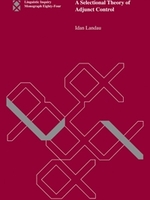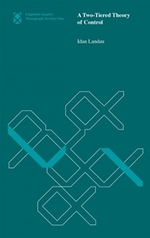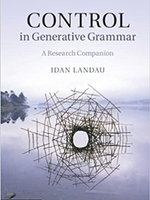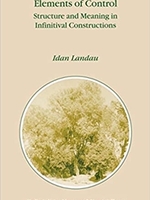Books

(MIT Press, 2021)
Control in adjuncts involves a complex interaction of syntax, semantics, and pragmatics, which so far has resisted systematic analysis. This book offers the first comprehensive account of adjunct control. Extending the framework developed in my earlier book, A Two-Tiered Theory of Control, the present book analyzes ten different types of adjuncts and shows that they fall into two categories: those displaying strict obligatory control (OC) and those alternating between OC and nonobligatory control (NOC). It explains how and why adjuncts shift between OC and NOC, unifying their syntactic, semantic, and pragmatic properties. It is shown that the split between the two types of adjuncts reflects a fundamental distinction in the semantic type of the adjunct: property (OC) or proposition (NOC), a distinction independently detectable by the adjunct's tolerance to a lexical subject. After presenting a fully compositional account of controlled adjuncts, we test and confirm the specific configurational predictions for each type of adjunct. We describe the interplay between OC and NOC in terms of general principles of competition—both within the grammar and outside of it, in the pragmatics and in the processing module—shedding new light on classical puzzles in the acquisition of adjunct control by children. Along the way, the book addresses a range of empirical phenomena, including implicit arguments, event control, logophoricity, and topicality.

(MIT Press, 2015)
This book revives and reinterprets a persistent intuition running through much of the classical work: that the unitary appearance of Obligatory Control into complements conceals an underlying duality of structure and mechanism. I argue that control complements divide into two types: In attitude contexts, control is established by logophoric anchoring, while non-attitude contexts it boils down to predication. The distinction is also syntactically represented: Logophoric complements are constructed as a second tier above predicative complements. The theory derives the obligatory de se reading of PRO as a special kind of de re attitude without ascribing any inherent feature to PRO. At the same time, it provides a principled explanation, based on feature transmission, for the agreement properties of PRO, which are stipulated on competing semantic accounts. Finally, it derives a striking universal asymmetry: the fact that agreement on the embedded verb blocks control in attitude contexts but not in non-attitude contexts. This book is unique in being firmly grounded in both the formal semantic and the syntactic studies of control, offering an integrated view that will appeal to scholars in both areas. By bringing to bear current sophisticated grammatical analyses, it offers new insights into the classical problems of control theory.

(Cambridge University Press, 2013)
The subject of nonfinite clauses is often missing, and yet is understood to refer to some linguistic or contextual referent (e.g. Bill preferred __ to remain silent is understood as Bill preferred that he himself would remain silent). This dependency is the subject matter of control theory. Extensive linguistic research into control constructions over the past five decades has unearthed a wealth of empirical findings in dozens of languages. Their proper classification and analysis, however, have been a matter of continuing debate within and across different theoretical schools. This comprehensive book pulls together, for the first time, all the important advances on the topic. Among the issues discussed are: the distinction between raising and control, obligatory and nonobligatory control, syntactic interactions with case, finiteness and nominalization, lexical determination of the controller, and phenomena like partial and implicit control. The critical discussions in this work will stimulate students and scholars to further explorations in this fascinating field.
Review 1 by Anna Roussou (Journal of Linguistics, 2014)
Review 2 by Shin-Ichi Kitada (English Linguistics, 2014)
Review 3 by Dennis Ott (Linguist List, 2020)

(MIT Press, 2010)
Experiencers — grammatical participants that undergo a certain psychological change or are in such a state — are grammatically special. As objects (John scared Mary; Loud music annoys me), experiencers display two peculiar clusters of nonobject properties across different languages: their syntax is often typical of oblique arguments and their semantic scope is typical of subjects. I investigate this puzzling correlation and argue that experiencers are syntactically coded as (mental) locations. Drawing on results from a range of languages and theoretical frameworks, the book examines the far-reaching repercussions of this simple claim. It shows that all experiencer objects are grammaticalized as locative phrases, introduced by a dative/locative preposition. “Bare” experiencer objects are in fact oblique, too, the preposition being null. This preposition accounts for the oblique psych(ological) properties, attested in case alternations, cliticization, resumption, restrictions on passive formation, and so on. As locatives, object experiencers may undergo locative inversion, giving rise to the common phenomenon of quirky experiencers. When covert, this inversion endows object experiencers with wide scope, attested in control, binding, and wh-quantifier interactions. This synthesis thus provides a novel solution to some of the oldest puzzles in the generative study of psychological verbs. This book offers the most comprehensive description of the syntax of psychological verbs to date, documenting their special properties in more than twenty languages. Its basic theoretical claim is readily translatable into alternative frameworks. Existing accounts of psychological verbs either consider very few languages or fail to incorporate other theoretical frameworks; this study takes a broader perspective, informed by findings of four decades of research.
Review 1 by Marco Nicolis (The Canadian Journal of Linguistics, 2010)
Review 2 by Andrew Carnie (Language, 2011)
Review 3 by Martin Salzmann (Journal of Linguistics, 2011)

(Kluwer Academic Publishers, 2000)
This book offers a new outlook on the derivation and interpretation of control constructions. Bringing together novel data and observations, it argues that Obligatory Control comes in two varieties: Exhaustive or Partial Control, the latter obtaining when PRO properly includes the controller. This distinction, arguably universal, is tightly linked to the tense specification of the infinitive. Non-Obligatory control, on the other hand, is structurally conditioned, obtaining only in VP-external infinitives. A detailed investigation of how control interacts with Super-Equi constructions and psychological predicates sheds new light on issues such as extraposition, argument structure and semantic selection. This book clears off some common misconceptions about the nature of control, as well as sharpening the empirical challenges that face any comprehensive theory in this domain. Regardless of theoretical framework, scholars of syntax and semantics interested in these topics will find this book a major contribution to the field.